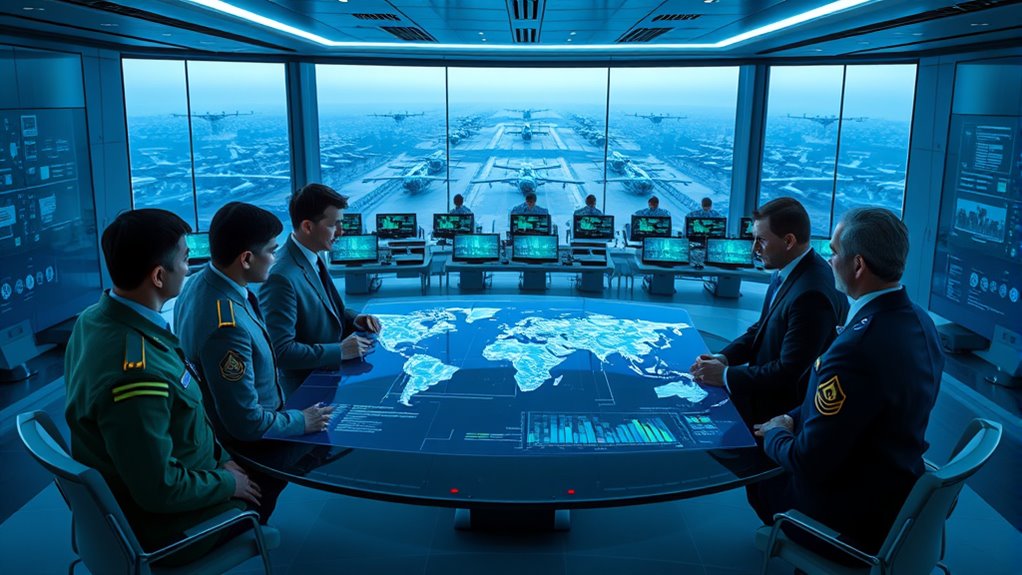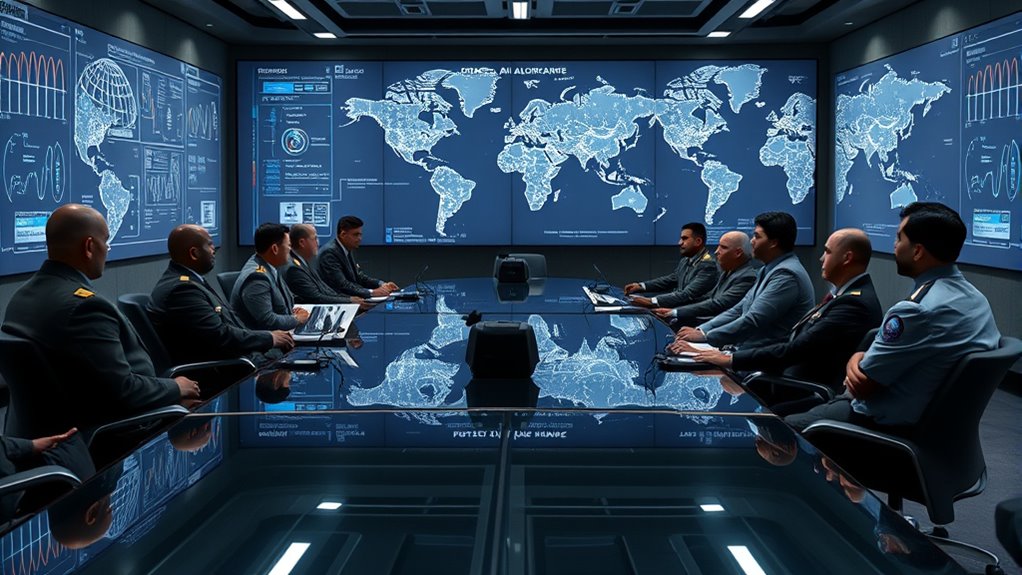Future AI governance in military contexts requires clear policies, ethical frameworks, and international cooperation to manage autonomous weaponry responsibly. You need transparency about system functions and human oversight to build trust and prevent misuse. Addressing cybersecurity and setting accountability standards are also crucial. As technology advances, developing robust governance models is essential to ensure military AI aligns with societal values and legal norms. Keep exploring to understand how these policies are shaping the future of military AI.
Key Takeaways
- Developing international regulations to ensure ethical use and accountability of autonomous military systems.
- Establishing transparent frameworks to build public trust and clarify decision-making processes.
- Implementing human oversight protocols to maintain meaningful control over autonomous weaponry.
- Addressing cybersecurity risks and preventing malicious hacking of military AI systems.
- Promoting multi-stakeholder collaboration among governments, military, ethicists, and technologists for responsible governance.

As artificial intelligence continues to advance rapidly, its integration into military systems raises urgent questions about governance and ethical boundaries. You’re likely aware that autonomous weaponry, which can select and engage targets without human intervention, is at the forefront of these debates. While such systems promise increased efficiency and reduced risk to soldiers, they also introduce complex ethical dilemmas. You must consider whether machines should have the authority to make life-and-death decisions, and if so, what rules should govern their actions. This challenge highlights the need for thorough ethical frameworks that can guide the development and deployment of autonomous systems. These frameworks must balance technological capabilities with moral responsibility. They should clarify under what conditions autonomous weaponry can be used, establish accountability standards, and ensure compliance with international law. As you examine these issues, it’s essential to recognize that current international agreements are limited in scope, often lacking specific regulations for autonomous systems. Developing clear policies requires collaboration among governments, military institutions, and ethicists to create standards that prevent misuse and unintended consequences. You might also consider that transparency plays a key role in building trust around autonomous weaponry. Governments and developers need to openly share information about how these systems work, their decision-making processes, and the safeguards in place. This openness can help mitigate fears of unchecked autonomy and ensure public and international oversight. Additionally, the question of human oversight remains central. Many experts argue that humans should retain meaningful control over autonomous systems, especially in critical situations. Establishing protocols for human intervention can serve as an ethical safeguard, preventing machines from acting outside moral boundaries. As you navigate future policy debates, it’s essential to stay informed about technological advancements and the evolving legal landscape. You should advocate for policies that prioritize ethical considerations, transparency, and accountability, rather than solely focusing on technological innovation. The development of robust ethical frameworks will be key to ensuring that autonomous weapon systems serve strategic interests without compromising moral standards. Moreover, addressing cybersecurity vulnerabilities in these systems is crucial to prevent malicious interference or hacking that could lead to unintended consequences. Ultimately, the challenge lies in crafting governance models that keep pace with technological progress while respecting human rights and ethical principles. You have a crucial role in shaping these discussions, ensuring that future military use of AI remains aligned with societal values and international norms. As the debate continues, your voice and actions can influence the policies that define the responsible development and deployment of autonomous weaponry worldwide.
Frequently Asked Questions
How Will AI Governance Impact International Military Alliances?
AI governance will substantially influence your international military alliances by emphasizing cyber sovereignty, which can lead to stricter data and AI use regulations among allies. This focus may enhance strategic stability by reducing misunderstandings and accidental escalations. However, it could also create divisions if countries prioritize their sovereignty over collective security, making alliances more complex. Staying adaptable and transparent becomes key to maintaining trust and cooperation in this evolving landscape.
What Are the Ethical Considerations for Autonomous Weapons?
You face moral dilemmas with autonomous weapons, questioning if they can truly distinguish between combatants and civilians. Ethical concerns loom large as accountability challenges arise—who’s responsible if a mistake occurs? The stakes are high, and the decision to deploy such systems isn’t straightforward. You must weigh potential military advantages against the risk of unintended harm, knowing that once activated, ethical boundaries become blurred and difficult to uphold.
How Can Transparency Be Maintained in Military AI Systems?
You can maintain transparency in military AI systems by addressing explainability challenges and ensuring data security. Focus on designing systems with clear, interpretable algorithms so you can understand their decision-making processes. Regularly audit data handling practices to prevent breaches and protect sensitive information. By prioritizing transparency and security, you help build trust and accountability, making it easier to oversee AI operations and uphold ethical standards in military applications.
What Role Will Civilian Oversight Play in Military AI Deployment?
Civilian oversight plays a crucial role in military AI deployment by ensuring public accountability and encouraging civilian participation. You’ll need to support transparent decision-making processes where civilians can voice concerns and influence policies. By involving civilians, you help maintain ethical standards and prevent misuse of AI in military settings. Your active engagement fosters trust and safeguards democratic principles, making sure military AI systems align with societal values and international norms.
How Will AI Governance Address Potential Escalation of Conflicts?
You might think AI risk is overstated, but effective governance is vital to prevent escalation of conflicts. By implementing strict protocols, transparent decision-making, and real-time monitoring, AI systems can be designed to recognize escalation signs early. This proactive approach helps guarantee that AI-driven military actions are controlled, reducing the chances of unintended conflict escalation and maintaining stability in tense situations.
Conclusion
As you consider future AI governance in military settings, remember that over 65% of defense experts believe AI regulation will become more urgent in the next decade. This highlights the critical need for clear policies to guarantee ethical use and prevent escalation. By staying informed and advocating for responsible AI frameworks, you can help shape a safer, more transparent future where technology serves peace rather than conflict. Your engagement makes a difference in this evolving debate.










